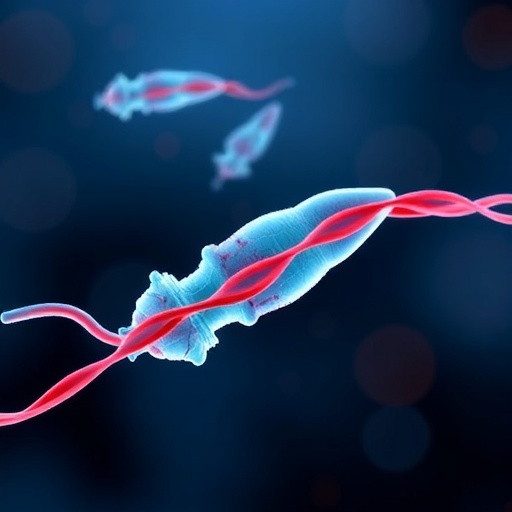In a groundbreaking study set to redefine our understanding of hereditary health and exercise science, researchers from Nanjing University and Nanjing Medical University have unveiled pivotal evidence that paternal exercise can profoundly influence the endurance and metabolic health of offspring. Published in Cell Metabolism, this research elucidates the critical role of sperm microRNAs as mediators of epigenetic inheritance, effectively transmitting the benefits of physical activity across generations.
Exercise has long been acknowledged as a cornerstone of human survival and thriving, deeply embedded in our evolutionary legacy. Our ancestors depended on sustained physical exertion for hunting, migration, and avoiding predators, which honed physiological capacities linked to endurance and metabolism. However, modern sedentary lifestyles have distanced us from these natural imperatives, raising questions about the long-term consequences on health and inherited traits. This study courageously delves into the molecular underpinnings that may bridge ancestral exercise habits with contemporary genetic and epigenetic inheritance.
The research team comprehensively demonstrated that offspring born to fathers who engaged in rigorous exercise regimes exhibit markedly improved endurance capabilities alongside optimized metabolic profiles, compared to progeny of sedentary fathers. Remarkably, similar benefits were observed in offspring from transgenic mice engineered to overexpress PGC-1α—a master regulator of mitochondrial biogenesis and oxidative metabolism—in skeletal muscle. These offspring inherited enhanced exercise adaptability and metabolic efficiency despite lacking direct inheritance of the transgene, suggesting an epigenetic rather than genetic mode of inheritance.
Fascinatingly, when sperm-derived small RNA populations from exercised fathers were microinjected into normal zygotes, the resultant offspring phenocopied the endurance and metabolic advantages seen in naturally conceived counterparts. This striking evidence implicates sperm microRNAs as crucial vectors of paternal environmental information, capable of altering early embryonic development and setting the stage for long-term physiological adaptations in the next generation.
Mechanistic insights revealed that both voluntary exercise and muscle-specific PGC-1α overexpression instigate a remodeling of the sperm microRNA landscape. These microRNAs target and downregulate nuclear receptor corepressor 1 (NCoR1) within early embryonic stages, thereby lifting repression on PGC-1α activity. This epigenetic reprogramming triggers a cascade of gene expression alterations that bolster mitochondrial biogenesis and oxidative metabolism in the developing embryo, effectively embedding endurance capacity and metabolic resilience into the offspring’s biology.
From a molecular perspective, this study uncovers a coherent intergenerational regulatory axis comprising paternal PGC-1α expression, sperm microRNA-mediated gene silencing, and embryonic NCoR1 modulation. This axis orchestrates the transmission of exercise-induced phenotypes, introducing a paradigm in which paternal lifestyle factors directly reconfigure offspring physiology without altering DNA sequence. Such an axis not only reshapes our understanding of inheritance but also spotlights sperm microRNAs as potent conveyors of environmental and experiential information across generations.
Importantly, the findings broaden the recognized functional repertoire of microRNAs, expanding their role beyond intracellular and intercellular signaling to encompass intergenerational communication. This underscores the concept that sperm RNA cargoes are epigenetically dynamic entities capable of encoding and transmitting complex biological information reflective of paternal physiological states, such as those induced by exercise training.
These results bear profound implications for public health in a world increasingly plagued by sedentary lifestyles, obesity, and metabolic disorders. By demonstrating that paternal exercise prior to conception significantly improves glucose homeostasis and promotes muscle glucose uptake in progeny, this study offers a promising avenue for breaking the cycle of intergenerational metabolic disease risk through lifestyle interventions. It challenges the conventional focus solely on maternal health during reproduction and highlights paternal behavior as a critical determinant of offspring well-being.
Moreover, the ability of sperm microRNAs to mediate non-genetic inheritance invites exploration into how other lifestyle factors—diet, stress, environmental exposures—might similarly sculpt offspring phenotypes. This opens a thrilling frontier in epigenetics where the interplay between environment, molecular carriers like microRNAs, and embryonic gene regulation can be decoded to inform precision health strategies.
While further research is necessary to explore the full spectrum of microRNAs involved and their possible interactions with other epigenetic mechanisms such as DNA methylation and histone modification, this study lays a robust foundation. It conclusively establishes paternal exercise as an influential factor in shaping offspring metabolic health via a precisely delineated molecular pathway involving PGC-1α, sperm microRNAs, and NCoR1.
These revelations may soon influence guidelines recommending preconception paternal lifestyle modifications. By leveraging natural physiological processes, future interventions could amplify health benefits transmitted to subsequent generations in a sustainable, cost-effective manner, heralding a new era of preventive medicine rooted in epigenetic inheritance.
In essence, the discovery that sperm microRNAs act as molecular couriers of paternal exercise-induced adaptations revolutionizes our understanding of heredity and health. It illustrates a biological memory encoded not within DNA sequences but within RNA molecules, carrying the legacy of a father’s lifestyle to shape the metabolic destiny of his children. Such insights not only broaden scientific horizons but also inspire a collective reevaluation of how lifestyle choices resonate far beyond individual health.
By bridging exercise physiology, molecular biology, and epigenetics, this pioneering work charts an inspirational course toward unlocking the secrets of intergenerational health transmission. It invites us all to consider the far-reaching legacy of our daily habits, emphasizing how the benefits of physical activity transcend the individual, echoing through the lives of future generations in the language of microRNAs.
Subject of Research: Animals
Article Title: Sperm microRNAs: Key Regulators of the Paternal Transmission of Exercise Capacity
News Publication Date: 6-Oct-2025
Web References:
http://dx.doi.org/10.1016/j.cmet.2025.09.003
References:
Yin et al. Paternal exercise confers endurance capacity to offspring through sperm microRNAs. Cell Metabolism. 6 October, 2025.
Image Credits: Cell Metabolism
Keywords: sperm microRNAs, epigenetic inheritance, paternal exercise, PGC-1α, mitochondrial biogenesis, NCoR1, endurance capacity, metabolic health, intergenerational transmission, glucose homeostasis, epigenetic regulation, embryonic development




